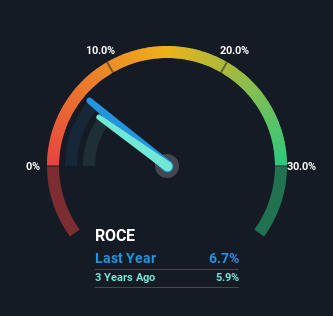- United States
- /
- Semiconductors
- /
- NasdaqGS:TSEM
Here's What's Concerning About Tower Semiconductor's (NASDAQ:TSEM) Returns On Capital

Finding a business that has the potential to grow substantially is not easy, but it is possible if we look at a few key financial metrics. Typically, we'll want to notice a trend of growing return on capital employed (ROCE) and alongside that, an expanding base of capital employed. Put simply, these types of businesses are compounding machines, meaning they are continually reinvesting their earnings at ever-higher rates of return. Having said that, from a first glance at Tower Semiconductor (NASDAQ:TSEM) we aren't jumping out of our chairs at how returns are trending, but let's have a deeper look.
What Is Return On Capital Employed (ROCE)?
For those who don't know, ROCE is a measure of a company's yearly pre-tax profit (its return), relative to the capital employed in the business. Analysts use this formula to calculate it for Tower Semiconductor:
Return on Capital Employed = Earnings Before Interest and Tax (EBIT) ÷ (Total Assets - Current Liabilities)
0.067 = US$177m ÷ (US$3.0b - US$324m) (Based on the trailing twelve months to March 2024).
Thus, Tower Semiconductor has an ROCE of 6.7%. In absolute terms, that's a low return and it also under-performs the Semiconductor industry average of 9.7%.
Check out our latest analysis for Tower Semiconductor

In the above chart we have measured Tower Semiconductor's prior ROCE against its prior performance, but the future is arguably more important. If you'd like, you can check out the forecasts from the analysts covering Tower Semiconductor for free.
How Are Returns Trending?
In terms of Tower Semiconductor's historical ROCE movements, the trend isn't fantastic. To be more specific, ROCE has fallen from 9.3% over the last five years. And considering revenue has dropped while employing more capital, we'd be cautious. This could mean that the business is losing its competitive advantage or market share, because while more money is being put into ventures, it's actually producing a lower return - "less bang for their buck" per se.
The Bottom Line
From the above analysis, we find it rather worrisome that returns on capital and sales for Tower Semiconductor have fallen, meanwhile the business is employing more capital than it was five years ago. Since the stock has skyrocketed 137% over the last five years, it looks like investors have high expectations of the stock. Regardless, we don't feel too comfortable with the fundamentals so we'd be steering clear of this stock for now.
On a final note, we found 2 warning signs for Tower Semiconductor (1 is a bit unpleasant) you should be aware of.
While Tower Semiconductor may not currently earn the highest returns, we've compiled a list of companies that currently earn more than 25% return on equity. Check out this free list here.
Valuation is complex, but we're here to simplify it.
Discover if Tower Semiconductor might be undervalued or overvalued with our detailed analysis, featuring fair value estimates, potential risks, dividends, insider trades, and its financial condition.
Access Free AnalysisHave feedback on this article? Concerned about the content? Get in touch with us directly. Alternatively, email editorial-team (at) simplywallst.com.
This article by Simply Wall St is general in nature. We provide commentary based on historical data and analyst forecasts only using an unbiased methodology and our articles are not intended to be financial advice. It does not constitute a recommendation to buy or sell any stock, and does not take account of your objectives, or your financial situation. We aim to bring you long-term focused analysis driven by fundamental data. Note that our analysis may not factor in the latest price-sensitive company announcements or qualitative material. Simply Wall St has no position in any stocks mentioned.
About NasdaqGS:TSEM
Tower Semiconductor
An independent semiconductor foundry, provides technology, development and process platforms for integrated circuits in the United States, Japan, Asia, and Europe.
Flawless balance sheet and good value.


